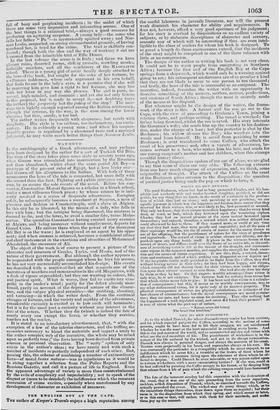MAHMOUD
Is the autobiography of a Greek adventurer, and may perhaps have been designed by the author for a sort of Turkish Gil Bias. The time of the story takes place sonic sixty or seventy years ago, when Greece was stimulated into insurrection by the Russians and then abandoned, whilst about the same period Ali Bey—a prototype of the present ruler of Egypt, but a less lucky one— had thrown off his allegiance to the Sultan. With both of these occurrences the hero of the tale is connected, but more fully with the second than the first. Fighting aml public intrigues are, how- ever, by no means the sole events of the novel. Before his con- version, Constantine Morozi figures as a scholar in a Greek school, under a most villanous Greek priest ; by whose crimes he is indi- rectly involved in a series of desperate adventures. Escaping safely, he subsequently becomes a merchant at Smyrna, a man of pleasure and fashion at Constantinople, and a slave at Algiers. In this city he is liberated, by the means of a lady, who falls in love with him; but the intrigue being discovered, the mistress is doomed to (lie, and the lover, to avoid a similar fate, turns Maho- metan. The quondam Constantine having created many enemies at Algiers, and being moreover without employment, departs for Grand Cairo. He arrives there when the power of the insurgent Ali Bey is on the wane; he is employed as an agent by his oppo- nent; and when success is achieved, becomes a confidential officer and chief instrument in the exactions and atrocities of Mohammed Aboodahad, the successor of Ali.
The object of the work is of course to present a picture of the character and manners of Greeks, Turks, and Moors, and of the nature of their government. But although the author appears to be acquainted with the people amongst whom he lays his scenes, he has not very successfully accomplished his design. His events are described with a matter-of-fact air that reminds one of the narratives of murders and monstrosities in the oh! Magazines, with a dash of vigour superadded; but they are wanting in colour, life, and poetical spirit. What is worse, they fail to excite any synt- pathy in the reader's mind ; partly for the defect already men- tioned, partly on account of the depraved nature of the charac- ters, and the vulgar physical atrocities—the stabbing, shooting, and torturing—in which the writer deals. From the continual changes of fortune, and the variety and rapidity of the adventures, considerable curiosity is excited as to how each will terminate ; but it is for the most part a curiosity without any interest in the fate of the actors. Whether they die (which is indeed the fate of nearly every one except the hero), or whether they survive, touches not the reader.
It is stated in an introductory advertisement, that, " with the exception of a few of the inferior characters, and the trilling ac- cessories necessary to blend the materials and impart a unity to the rather complex web of the narrative, the whole may be relied upon as perfectly true ;" the facts having been derived from private sources or personal observation. The " unity " spoken of only i
exists n the author's ideas ; we have rarely met with such a number of incidents so perfectly independent of each other. But, passing this, the scheme of combining a number of extraordinary facts—of moral lusus naturce—was as injudicious as it would be to string together a selection from the Police Reports and the Sessions Gazette, and call it a picture of life in England. Even the apparent advantage of variety is more than counterbalanced by the evils of complexity and improbability ; not to speak of the disgust or (more to be dreaded) the indifference which the constant succession of crime excites, especially when unredeemed by any development of character or exhibition of manmers.


























 Previous page
Previous page